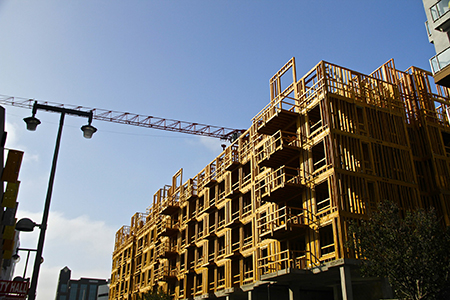
What is at risk for the construction industry after the 2020 elections?
Election Day 2020. We know that potential policy and tax-related changes may emerge due to a possible exchange of power at the federal level. We have to be ready for policy changes with which we are not familiar. However, we know with certainty that we will be electing congressional leaders who will draft legislation and vote on bills that affect the construction industry, a foundational element of the U.S. economy.
There is much uncertainty in predicting which promises different elected officials will follow through, but we have one certainty: our importance in this election. As voters, we are responsible for electing congressional leaders who work towards building more job opportunities and helping people achieve their dreams. The idea of the “American Dream” is more than just a trite phrase; it is a promise.
Looking at the past four years, confidence, as reported by chief executive officers in the construction industry, has hit the roof. Before the COVID-19 pandemic, construction spending triumphed at a record of $1.4 trillion per year, sustained by a thriving economy and record-low unemployment. The Tax Cuts and Jobs Act, the first major tax overhaul passed in the last thirty years, dropped the pass-through income tax rate by 10 points. The Act doubled the estate tax exemption, encouraged reinvestment, and created other employment opportunities in different sectors that work with the construction industry.
Generally, in the U.S, the construction industry has tended to pay the highest effective tax rate of any such industry. The tax reform legislature’s outcomes include construction companies investing and expanding their businesses, investing in their staff, and welcoming new talent. The Act gave them the capital to do so. They also had enough revenue to expand their training and career opportunities for current employees, a worthwhile initiative in the construction industry.
Both Congress and the current presidential administration also jointly worked together to reduce workplace gaps and create more workforce development opportunities.
President Trump established the Task Force on Apprenticeship Expansion to which he appointed ABC and the National Council for the American workers. ABC signed the agreement and committed to employing and developing opportunities for 500,000 workers in 2018-2023.
The dual-party FIRST STEP Act, a criminal justice reform bill, reduces reoffending rates and refined educational opportunities for those who need a second chance. This bill permits federal prisons to create partnerships with private entities to offer prisoners educational, skills-based that could lead to long-term career opportunities in industries like construction. These creative policies have played a vital role in changing the image of professionals and inviting more workers to learn skilled trades in high demand. According to the U.S Bureau of Labor Statistics, the average hourly wage for construction workers has increased by 11.2% since January 2017.
Looking to the next four years, we need to keep the momentum going. We need to make sure that we do not stagnate. While what is happening day-to-day in D.C seems far removed from our daily lives, these legislative have an enormous impact on construction business and even our local communities. If politicians from different parties can find common ground and work together on contentious policy issues, much can happen. For instance, an infrastructure bill could prove beneficial for everyone—especially considering America’s schools, bridges, and highways are generally weakening across the U.S. The American Society of Civil Engineers gave the U.S. infrastructure a D+ letter-grade in 2017 and predicted a $2 trillion, 10-year investment gap. Issues like infrastructure need bipartisan support to create a plan to address this significant problem.
Politicians need to prioritize legislation that provides the public with the best product quality at the best possible price, improving the economy. Such legislation would allow U.S. construction companies to bid for public works projects. Such a plan cannot order project labor agreements (PLAs) on federal and federally assisted construction projects. It must invite all construction workers to bid and work on projects in their communities and build better places for themselves and their communities, paid by tax dollars. If PLAs are mandated on publicly funded construction projects, it will result in less opposition, and taxpayers will accept increased costs of 12% to 20%. That means taxpayers will obtain and receive returns on only four schools, roads, and bridges for the price of five.
Additionally, lawmakers need to address the construction industry opposition against the divisive PRO Act (H.R. 2474), passed by the U.S. House of Representatives in February 2020. This legislation is full of labor policy changes that would strip workers of their freedom of choice, privacy and repeal 27 state right-to-work laws. This policy initiative will be detrimental to employers of almost nine out of ten workers and would ultimately prevent firms from competing for taxpayer-funded construction projects.
We cannot afford such wastage with America’s infrastructure, significantly as many states and cities recover from the deadly effects of the COVID-19 pandemic. Politicians at every government level must work together and assist in building a business climate that provides maximum benefits for infrastructure and taxpayers’ money. Such policy foundations will lead to additional job and career opportunities for all workers. As estimated by ABC, every $1 billion in extra overall construction spending generates an average of a minimum of 6,500 construction jobs.
As America strives to battle the health and economic consequences of COVID-19, we need to concentrate on a complete infrastructure package rooted in fair and open competition, workforce employment, safety, and training to get construction workers back out in the field. This idea is especially poignant as the industry has only recovered 59% of the jobs lost since the beginning of the pandemic-induced depression.
As voters and citizens, we need to make sure the construction industry’s voice is heard in November. We must elect representatives who put bigoted differences aside, tackle significant issues, and permit the construction industry to “reconstruct” America to keep our economy competitive and rising.


